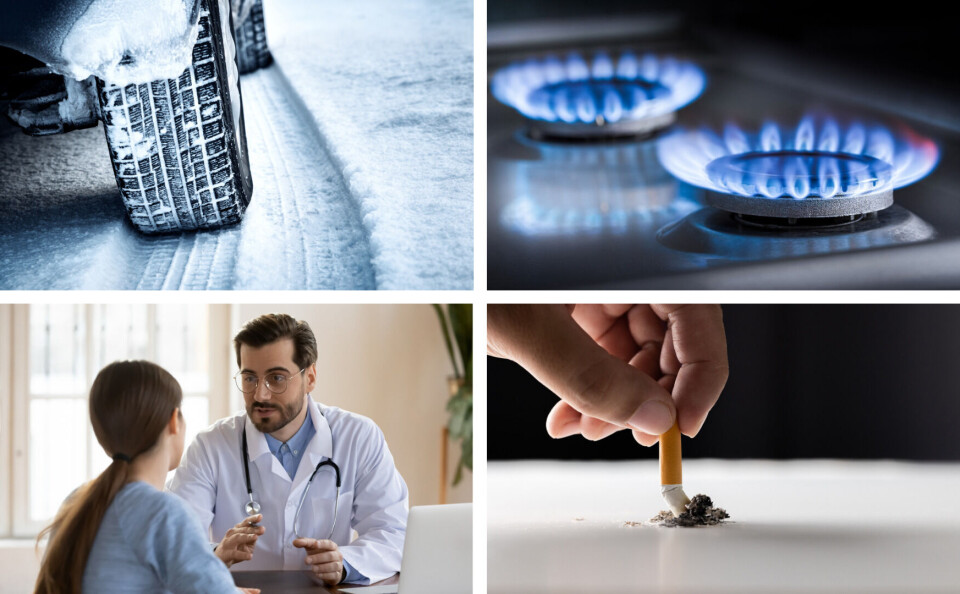-
Many Société Générale customers to be charged additional fees from April
There is some good news for international banking and instant transfers, however
-
Why gas prices in France are rising in April - and by how much
It comes after six consecutive monthly rises. Try these tips to reduce your bills
-
New notaire data suggests easing of Paris property crisis
Property experts have talked of ‘easing pressure’ and ‘breathing space’ after a four-year slump
Eight changes for French residents taking effect from November 1
Doctors’ fees, gas and Netflix prices are all set for revision

1: Increase in doctors’ fees
The cost for an appointment to see a GP (médecin traitant) rises from €25 to €26.50 on November 1.
Fees to see a specialist that were previously €30 will increase to €31.50. Many other medical tariffs will also rise by €1.50
In all cases, however, the amount reimbursed by Assurance Maladie (Social Security) will remain at 70%, with top-up insurance, such as from a mutuelle if you have one, covering almost all of the remaining 30%.
The change is expected to cost the state around €600 million a year.
Many doctors still want the fee to be higher - some as much as €50 - and recently staged a strike over the issue. The rise means the cost of top-up insurance could also increase.
Read more: Doctors pause their strike in France: Will consultation fees go up?
2: Gas prices likely to go up
Despite an end to regulated gas tariffs earlier this year, the Commission de Régulation de l'Energie (CRE) still publishes monthly statistics including a ‘benchmark’ price for gas that consumers can compare their contract to.
Between October and November, however, this benchmark price is set to “increase by €3.83 /MWh… resulting from the rise in wholesale gas prices observed this autumn,” said the CRE.
In effect, this means the cost of gas will also increase for consumers, no longer protected by regulated tariffs with set prices.
Read more: Tips and help on navigating the new changes to France’s gas market
3: Snow tyres are mandatory in some areas
Snow tyres become mandatory in all or some communes in 34 departments from November 1.
Vehicles must have either snow tyres, all-season tyres, snow chains or snow ‘socks’ for their tyres, if driving through a zone with the Loi Montagne in place.
Police officers will be able to carry out checks but fines will not be levied on drivers who do not have the equipment in place this winter as it is being treated as a year of updating drivers.
Snow tyres are required in the areas adhering to the Loi Montagne until March 31, 2024.
Read more: MAP: The French areas that require snow tyres this winter
4: Winter truce for tenants
The trêve hivernale (winter truce) for tenants comes into effect from November 1 and lasts until March 31.
It prevents landlords from evicting tenants – including those in arrears – during the winter.
In addition, landlords cannot order gas, water, and electricity supplies to their tenants be cut, even if they have not kept up with bill payments.
However, the rule does not apply to squatters, who can still be evicted.
5: Change to pension scheme
People who receive a private French pension under the Agirc-Arrco scheme will benefit from a 4.9% increase from November 1.
In addition, a penalty that withdraws 10% of a pension for three years from anyone who retired at the statutory retirement age, rather than working an extra year, will be eliminated from December 1.
Payments into this supplementary scheme affect all private-sector workers in France.
Agirc-Arrco converts contributions into points. Upon retirement, these are converted to pension payments.
Future rises, currently agreed at 0.4% below the annual level of inflation between 2024 and 2026, might also change.
6: Judges can help resolve disputes
Cases involving disputes brought before the courts can now be amicably solved by a judge prior to a hearing and subsequent ruling.
From November 1, a confidential discussion can be had before a hearing between the judge and parties that can lead to an amicable settlement.
If it does, the parties can draw up an agreement with the help of the court clerk.
You can read more about the change here on the official Service Public website.
It follows changes in October that require certain disputes – such as those between neighbours – to have a conciliateur de justice attempt to find an amicable settlement before they can be taken to court. You can read about that below
Read more: How you must try to resolve neighbour disputes amicably in France
7: Netflix price increase
Streaming service Netflix will charge more for some of its subscription packages in France from November.
Two of the four offers available are affected: the ‘Essential’ package, at €8.99 per month, has increased to €10.99, and the ‘Premium’, at €17.99 per month, has risen to €19.99.
The price of Disney+, a similar streaming service for content produced or owned by Disney, will also increase.
8: Anti-smoking campaign
France’s ‘month without tobacco’ begins on November 1, offering help to those who want to quit smoking.
Run by France’s public health body, over 100,000 people have already signed up to stop smoking for the month
More information can be found on the official website, including guides, an official app, and testimonies from those who have used the month to quit smoking.
Help kits which include nicotine patches will also be given out.
Related articles:
Winter tyres, Crit'Air stickers, book charge: ten updates in France
























